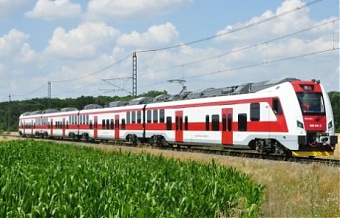Covid-19, EU – Baltic States, Latvia, Legislation, Railways, Transport
International Internet Magazine. Baltic States news & analytics
Wednesday, 28.01.2026, 17:00
Skoda plans to deliver electric trains on time for Latvia
 Print version
Print version |
|---|
In her words, Skoda Vagonka has informed the Latvian rail company that they are doing everything they can to comply with the contract terms and make and deliver the trains on time.
At the same time, the train maker informed Pasazieru Vilciens that just like businesses across the world, the company has been dealing with various difficulties since March. Some employees of Skoda Vagonka have had to quarantine at home and some production units have been temporarily closed, which has affected productivity. Also due to the pandemic, there have been delays in supplies of materials and parts.
Licite indicated that a number of in-person meetings between Pasazieru Vilciens and Skoda Vagonka representatives had to be cancelled because of travel restrictions but that the company has been able to arrange all the necessary meetings remotely and the implementation of the project has not been significantly affected.
For the time being, Pasazieru Vilciens and Skoda Vagonka have not agreed on an extension of the original train delivery deadline, but it is also clear that the situation with Covid-19 has not yet stabilized, which means that both Skoda Vagonka and its suppliers are still experiencing various difficulties.
As reported, on July 30, Latvia’s state-owned rail company Pasazieru Vilciens (Passenger Trains) signed a train purchase contract with the Czech company Skoda Vagonka (Skoda). Under the agreement, all 32 electric passenger trains have to be delivered by 2023.
The new electric trains will have four carriages each and the length of each train will be 109 meters, which means that their total length will reach 3.5 kilometers. Each train will have seats for 436 passengers and the total number of passenger seats will be 13,952. At present, Pasazieru Vilciens has 26 electric passenger trains of various length and with various number of passenger seats. The total number of passenger seats in Pasazieru Vilciens trains is approximately 10,000.
The new trains will be equipped with climate control and modern amenities, as well as video and audio information systems. The new trains will run smoother and less noisily on the tracks than the old ones. The constructive speed of the Skoda trains will be up to 160 kilometers per hour as compared to 130 kilometers per hour of the existing trains.
Pasazieru Vilciens will receive electric trains ready for passenger transportation, with the manufacturer expected to provide the certification and testing of the trains.
After the purchase of the new trains, Pasazieru Vilciens will be able to introduce a fixed-interval schedule for train departures on all railway routes, which means that during morning and evening rush hours trains will be departing every 15 to 20 minutes. The new trains will be running on the Aizkraukle, Tukums, Jelgava and Skulte lines.
As reported, the Latvian government has approved the purchase of electric trains for the state-owned joint-stock passenger rail company Pasazieru Vilciens (PV) from Skoda Vagonka.
The government has thus approved long-term liabilities to the national budget for a total of EUR 255.889 million.
The new electric train project will include the purchase of 32 new electric trains, necessary parts for a period of five years, maintenance equipment and the construction of a maintenance and a repair center for the aforementioned sum.
As part of the project, the state will grant the following subsidies - EUR 36.632 million in 2019, EUR 4.5 million in 2020, EUR 15.053 million in 2021, EUR 125.923 million in 2022, EUR 44.268 million in 2023 and EUR 29.512 million in 2024.
- 28.01.2022 BONO aims at a billion!
- 26.08.2021 LLC Dizozols Investments finalizes investment attraction deal with Crowdestor with record-high profits
- 25.01.2021 Как банкиры 90-х делили «золотую милю» в Юрмале
- 30.12.2020 Накануне 25-летия Балтийский курс/The Baltic Course уходит с рынка деловых СМИ
- 30.12.2020 On the verge of its 25th anniversary, The Baltic Course leaves business media market
- 30.12.2020 Business Education Plus предлагает анонсы бизнес-обучений в январе-феврале 2021 года
- 30.12.2020 Hotels showing strong interest in providing self-isolation service
- 30.12.2020 EU to buy additional 100 mln doses of coronavirus vaccine
- 30.12.2020 ЕС закупит 100 млн. дополнительных доз вакцины Biontech и Pfizer
- 29.12.2020 В Rietumu и в этот раз создали особые праздничные открытки и календари 2021








 «The Baltic Course» Is Sold and Stays in Business!
«The Baltic Course» Is Sold and Stays in Business!

